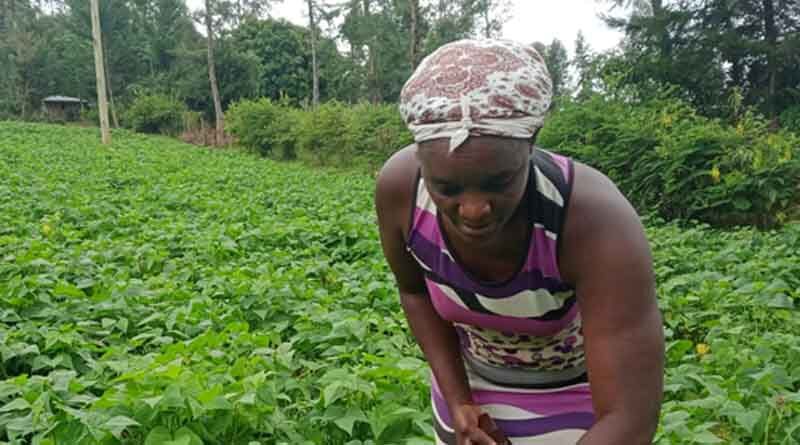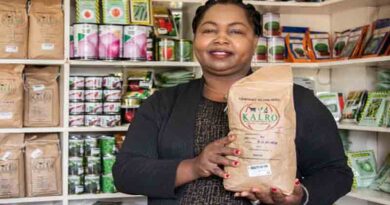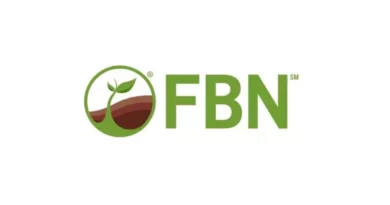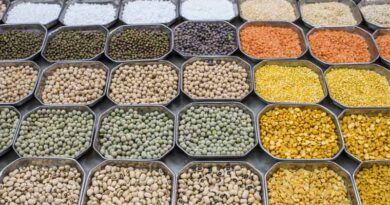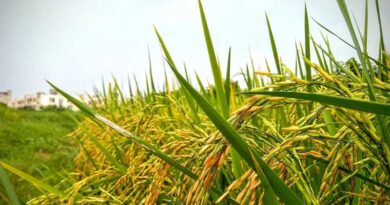A Livelihood Success Story: Kenyan Farmer Coop Taps Iron Beans for Increased Incomes
26 September 2022, Kenyan: The members of the Abossi Top Hill cooperative farming society in Kenya’s Bomet County have a good problem: there is too much demand for their iron-biofortified beans.
In just a few years, the expanding Abossi coop membership has turned their iron bean production project into a profitable enterprise which is noticeably improving their livelihoods as well as their nutrition. The coop is in a low-income rural region where farming households have traditionally stuggled to generate sufficient earnings from surplus harvest and cash crops. Through the Commercialisation of Biofortified Crops (CBC) programme, which is co-led by the CGIAR’s HarvestPlus program and the Global Alliance for Improved Nutrition (GAIN), the community was introduced to iron beans in 2019.
The beans are in demand from local consumers who like their taste, cooking properties, and nutritional benefits, and from commercial customers as far away as the capital Nairobi, who appreciate the quality and consistency of the grains they receive. Bomet Country is located in the west of the country, in the Rift Valley region.
“The farmers are really convinced that they should grow iron beans because, above all, they are getting a good income from it,” said Hellen Keti, a farmer who serves as the coop’s chairperson. “Now, most of our farmers have enough money to pay school fees for their children. It has changed their lives.” One of these farmers, Monica Chemweno, said she is using proceeds from her beans to cover her son’s university tuition and expenses.
Farmers in the area had been trying to work together to improve their collective fortunes since 2016, when 10 of them formed a self-help group to pool their resources. They subsequently established a more-formalized Community Based Organization with 85 members, but real progress remained elusive. The idea to form a coop followed exposure to iron beans. The coop structure has allowed the farmers to strengthen their negotiating power with input suppliers, and on the demand side by pooling their produce and adopting measures to ensure high bean quality.
Penina Muoki, the HarvestPlus program manager for the CBC programme in Kenya, said CBC staff have been working with the coop over the past two years to help them access certified bean seed, increase productivity through improved agronomic methods, link them with grain buyers, “and also ensure they can meet the quality and the quantity that the buyers are looking for.”
According to Hellen, farm productivity has increased dramatically during this period. “Before meeting HarvestPlus, our farmers were producing about 180 kilograms (KG) per acre. But now, after all the technical advice we have received from them, our farmers are able to produce as much as 820-900 KG per acre,” she said.
Equally as important has been the improvements in quality and consistency of the bean product. While this was not necessarily a major issue in the local informal market, it is essential to attract repeat business on the commercial scale. The CBC programme has provided the coop with a moisture measurement tool, a scale, and other equipment to support quality output.
“Previously we just grew beans like any other crop, not in a commercial style. But now we know we are in an agribusiness, so our farmers are being taught how to go into the real business of farming,” said Hellen. A key element of this is to have the farmers grow the certified biofortified varieties exclusively, rather than the 15 or so types of beans they traditionally grew, which were often sold as mixed products.
“A main challenge the farmers were having was to find a market [for their produce]. But now as a cooperative, they are able to have that bargaining power with the buyers. So the issue of dealing with middlemen is not a problem for them because they are talking directly to the buyers,” said Hellen.
Higher output and quality are clearly paying off in terms of sustainable sales for the coop members, who total about 200 currently and are anticipated to surpass 300 next year. Commercial customers, like Nairobi-based Spice World Ltd. are appreciating how the coop can deliver product that does not require extensive vetting and sorting.
“The consignment of 10 MT of Nyota beans we received from Abossi in Bomet was very clean,” said Miriam Ndungwa, a procurement manager at Spice World. “During analysis at the point of off-taking, the total loss was at about 7 percent, while our minimum requirement was 10 percent. I say this was very clean because from some aggregators during that period we were off-taking, went as high as 12 percent, which is almost double the figure of Abossi.”
The iron beans have also become very popular among the local population, which will contribute to better nutrition and health of farming households and nearby consumers. Hellen explained that, prior to the introduction of the Nyota and Angaza iron bean varieties, beans were eaten infrequently because existing varieties caused digestive issues and were more vulnerable to pests and crop diseases in the field. But now everyone wants to eat beans regularly. “I remember my husband didn’t like beans, but now if we don’t have any, he complains. It is a must to have beans on our menu,” said Hellen.
In fact, local consumer demand is so strong that the coop is often able to fetch better prices from local customers than from larger processors. Nearby customers also include schools which purchase iron beans for meals they serve to students—ensuring that better nutrition is reaching a key target group vulnerable to micronutrient deficiency. Hellen said she was currently negotiating with a school that wants to purchase 3.6 MT of Nyota beans.
To be sure, the coop members also face challenges, notably the increasing costs of farm inputs, and finding sufficient storage space for the rapidly increasing volume of beans they are producing. In addition, the coop is working on ways to ensure that farmers can get paid as soon as they deliver their beans, rather than have to wait until beans are sold on to customers. “When farmers give us beans, they need money immediately because they are facing [financial] issues,” said Hellen. “We’ve done what we can, but not to the level they would like, so we are looking for solutions,” she added.
Even so, she emphasized that these challenges are not holding back the progress and expansion of their iron bean business, which has proven to the farmers that there is a bright future for them in agriculture.
The CBC Programme, funded by the Government of the Netherlands and the Germany Federal Ministry for Economic Cooperation and Development, works with partners in African and Asian countries to scale biofortified crops and foods through commercial channels. Click here for more information.
Also Read: Wholesale price of garlic in Madhya Pradesh lowest in last three weeks
(For Latest Agriculture News & Updates, follow Krishak Jagat on Google News)

